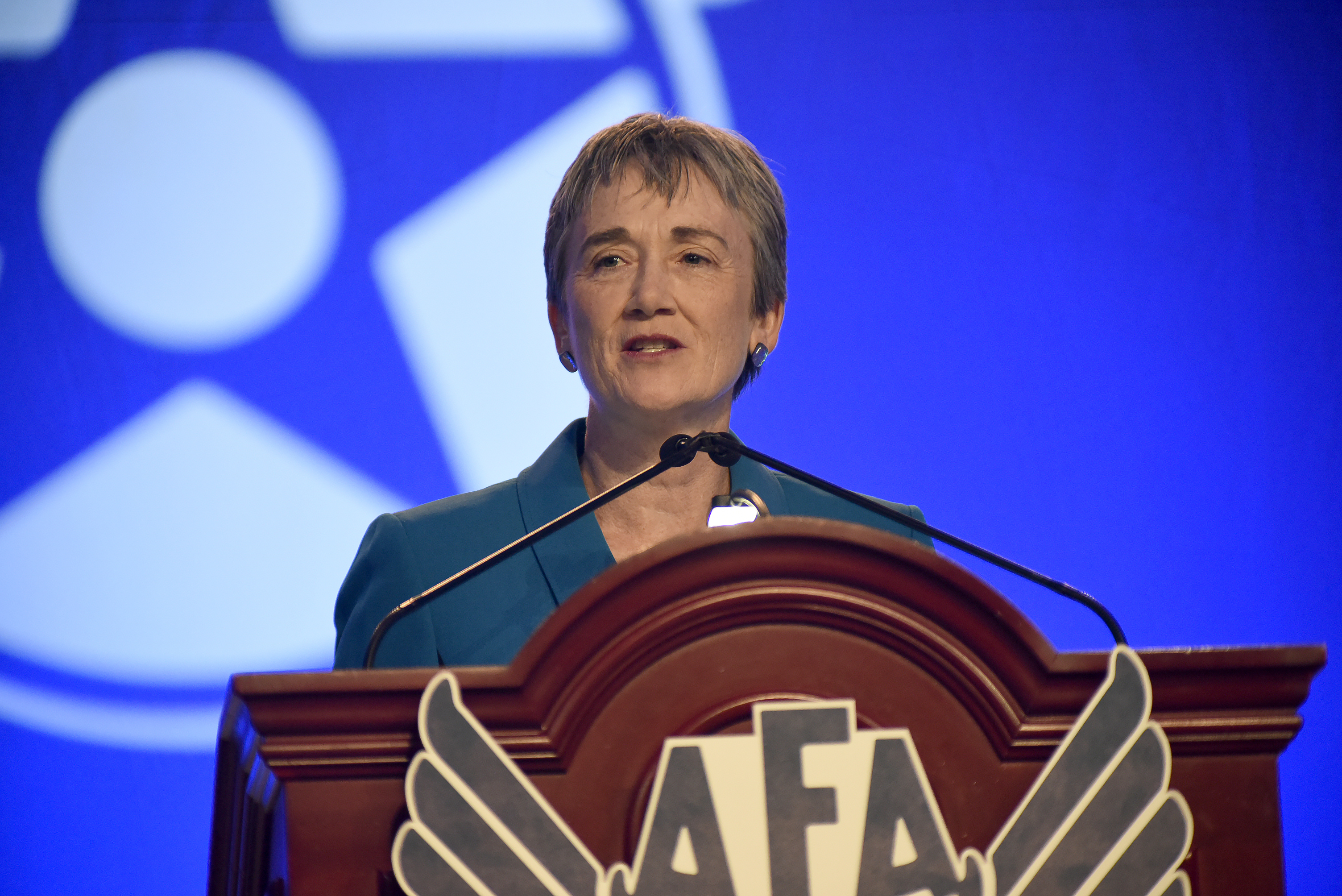Air Force Secretary Heather Wilson told ASC17 attendees USAF's strength will decrease unless federal funding and service priorities shift. Staff photo by Mike Tsukamoto.
Air Force Secretary Heather Wilson used her first State of the Air Force briefing to both praise the capability and strength of the service and, conversely, sound an alarm: Unless funding changes in the government and priorities shift within the service, that same strength may not last.
“We are really good at what we do,” Wilson said at ASC17. “Our nation, our joint team, and our allies depend upon us to control the skies; to provide intelligence, surveillance, and reconnaissance; to put precision weapons right where they need to be. … Here’s the stark reality. The United States Air Force is too small to do all that the nation expects of it.”
Congress, for nine of the past 10 years, has passed 31 continuing resolutions instead of approving a new budget. That lack of a budget means the Air Force has not been able to innovate, modernize, or even start any new programs. At the same time, the Budget Control Act has severely hamstrung the Air Force’s ability to spend enough on training, force structure, or even weapons.
Airmen in the field, faced with constant ongoing operations, coupled with a lack of training at home, have told Wilson “they got this” when faced with the mounting strength. But, in Washington, “we don’t got this,” Wilson said.
The Air Force is in its 26th straight year of combat operations, dating back to the beginning of the Gulf War, and “that demand for airpower is not going to abate any time in the near future,” Wilson said.
During a recent visit to the Middle East, Wilson said she met with B-52 crews who had flown 573 missions straight without a single bomber stopped for maintenance. During that span, the aircraft had flown more than 700 “danger close” bombing runs to support Iraqi forces and US-backed fighters in Syria. These are missions that the jet was never designed for, and coming at a time when the B-52 crews would have to return home to Minot AFB, N.D., and prepare for a nuclear surety inspection 10 days after their deployment ended.
“I am concerned we’ve become too accustomed to the current battle rhythm where surge is the new normal,” Wilson said.
Aircrews are not getting enough time to train for missions such as operating in a contested environment, high-end fights, and the nuclear mission, Wilson said. More personnel and funding for flying hours are required to ensure the readiness in these missions.
A shortfall is also hitting the weapons stockpile in the service. Since 2014, USAF aircraft have dropped more than 54,000 precision weapons in the fight against ISIS. These precision weapons have “changed the way we fight, and we’re not going back,” Wilson said. “The world will not tolerate imprecise weapons.”
USAF is working to manage its shortfall of weapons, and will work more closely with industry to ensure that more smart bombs can make their way to the fight.
Effective modernization needs to be coupled with a push to innovate, especially in realms such as space and cyber, Wilson said. To address this, the fiscal 2018 president’s budget request called for a 20-percent increase in funding for Air Force space systems.
Additionally, Wilson announced Monday the Air Force is kicking off a 12-month review and revision of its space and technology strategy. The effort, which is led by the Air Force Research Laboratory, along with efforts by the Scientific Advisory Board, will prioritize what the Air Force researches and how. It will “define our highest research priorities, for sure,” along with ways to strengthen relationships with research universities and other entities so that the Air Force becomes a “sponsor of choice.”
A new look at research will be needed to ensure long-term dominance in air and space superiority, Wilson said. A review will make sure money is spent the right way to advance this mission.
“Air and space superiority are not America’s birthright,” Wilson said during her speech. “We earned it the hard way, and we are not going to give it up without a fight.”
